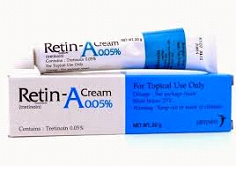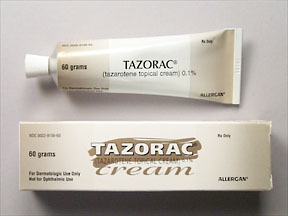Retinoids Topical retinoic acids are the “first line” and “the gold standard” treatment for acne
Retinoids are a class of medication that regulates skin cell growth, which makes this product a very effective treatment for a number of dermatological diseases including, but not limited to, acne. Retinoids are made for topical use as an ointment, cream, lotion, gel, and liquid.
Commonly used retinoids (Retinoic acids) are as follows:
- Retin-A (Tretinoin)
- Tazorac (Tazarotene)
- Differin (Adapalene)
- Acitretin (Soriatane)


Retinoids are derivatives of Vitamin A that are made naturally by the body as well as synthetically in the laboratory as a medication. Retinoids are the main key treatment for acne, as well as therapy for various diseases such as psoriasis.
These agents normalize the shedding of the hair follicle lining and have direct anti-inflammatory effects, thereby preventing the blockage of pores and decreasing the formation of comedones (blackheads and whiteheads); unplugging existing comedones; and allowing other topical medicines (such as antibiotics) to enter the follicles.
What are the functions of natural Retinoids throughout the body?
- Retinoids are essential elements for vision
- They regulate the growth of the bone and tissue
- They regulate cell proliferation and epithelial cell growth
- They regulate immune function and activate tumor suppressor
Retinoids other benefits and usage
- Acne treatment
The main usage for retinoids is to treat and control acne by regulating the cell growth of hair follicles and skin.
- Anti-aging
Retinoids are commonly used as topical and oral antioxidants to reverse sun damage (photoaging) and prevent signs of aging.
- Psoriasis treatment
It is a treatment for psoriasis that regulates cell proliferation and epithelial cell growth.
- Cancer prevention
Isotretinoin (ACCUTANE), the oral version of retinoids, is used to prevent cancer such as leukemia by regulating immune function and activating tumor suppressor genes. It is also used as chemotherapy for brain and pancreas cancer because of its ability to kill rapidly dividing cells.
How to use and apply Retin-A cream
- Wash the skin
Wash the skin with recommended cleanser and cool or lukewarm water twice a day or more frequently if your skin is too oily. Pat skin dry only and avoid vigorous rubbing of the skin.
- Avoid irritants
Use of hot water, alcohol, and acids must be avoided. Avoid using the cream in thin areas, such as around eyes and under the lower corner of the mouth unless it is advised differently.
- Apply only once every night
Retinoids come in gel or cream and must be applied to the skin once at bedtime. Remember that your skin is going to be sensitive to the sun regardless of the daytime.
- Retinoids Strength
Retinoids are available in full (0.1%) , half (0.05) and quarter(0.025) strength. Dr. Shafa usually prescribes full strength and instructs you to apply a smaller amount of the cream if your skin is matured, aged, thin, or too sensitive. This saves you recurrent trips to the pharmacy.
- Start applying a pea-sized amount
Start applying a pea-sized amount of the Retinoid cream to the entire face by dotting it on followed by gently smearing it across the skin.
- Give it time
Your skin needs time to get used to the retinoid cream. After a week you start seeing the unwanted effect of the Retinoids, irritation, and peeling of the skin. These unwanted effects subside after a few weeks.
- Modify the amount used
people’s skin tolerance is different. During treatment, you can use a smaller amount of cream if your skin is reacting too much. Likewise, you can increase the amount if you do not see peeling after 7-10 days.
- Get a break
you may give a day or two break to your skin if you notice annoying, unwanted effects of the cream (side effects listed below). Afterward, continue the treatment with a smaller amount of the cream at bedtime.
- OTC hydrocortisone cream
OTC hydrocortisone cream 1% up to three times a day for just a few days can be used if the skin is too irritated.
- Moisturizer use
Retinoids give a creamy soft feeling to the skin at bedtime. No additional moisturizer is needed at bedtime. During the day you may apply a non-comedogenic moisturizer if your skin feels too dry.
Retinoids side effects
- Dry skin
these agents control acne by diminishing the oil production which causes dry skin.
- Flakiness and peeling of the skin
occur only within the first few weeks of the treatment. Dead layers of the skin, which clog the pores, peel off with treatment.
- Initial worsening of the acne
bear with it! Retinoids treat acne by shedding and normalizing the hair follicle lining. The dead peeled skin debris can be the cause of clogged pores at the beginning of the treatment.
- Photosensitivity
retinoids make your skin more sensitive to the sun and radiation. Your skin can become red, irritated, or more easily sunburned with direct sun exposure.
- Avoid pregnancy
if you are pregnant or become pregnant, you must stop using Retionoic acid.
- Increased skin sensitivity
when you start applying Retinoid products to the skin or wash your skin with the cleanser, you might feel increased skin sensitivity, tingling, stinging, warmth, itching, and irritation. This is a temporary side effect and will subside over time; in this case, you may decrease the amount of cream or frequency of use until your skin adapts to it.
Other Treatments
Acne Surgery | Acne Home Therapy | Accutane or Isotretinoin | Topical Treatment for Acne | Acne Scar Overview | Acne Scar Correction with TCA | Acne Scar Leveling with Plasma Laser and Steroid Injection | Fractional CO2 Laser for Acne Scar | Subcision for Acne Scars Removal | Scar Excision – A Good Choice for Deeper Scars | Acne Before and After
Schedule a Consultation
